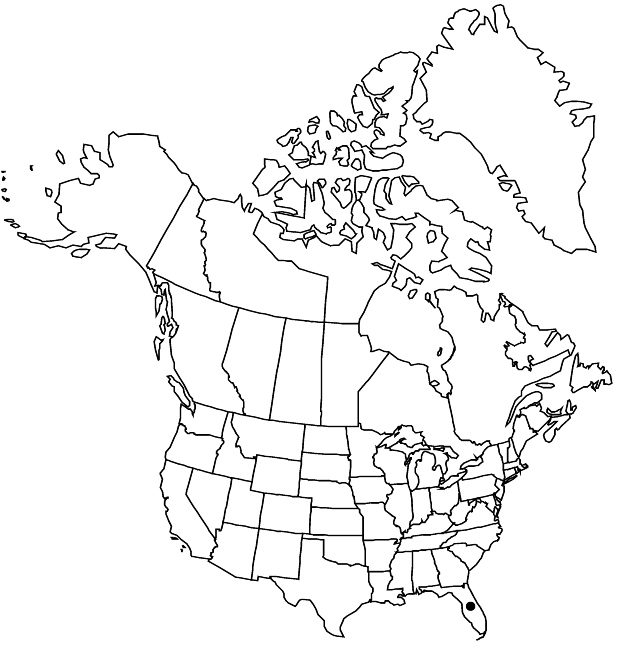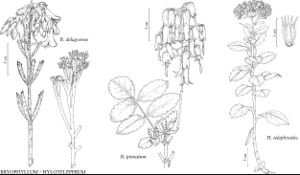Difference between revisions of "Bryophyllum pinnatum"
Allg. Naturgesch. 3: 1966. 1841 ,.
FNA>Volume Importer |
imported>Volume Importer |
||
| (3 intermediate revisions by 2 users not shown) | |||
| Line 10: | Line 10: | ||
|name=Cotyledon pinnata | |name=Cotyledon pinnata | ||
|authority=Lamarck | |authority=Lamarck | ||
| + | |rank=species | ||
|publication_title=in J. Lamarck et al., Encycl. | |publication_title=in J. Lamarck et al., Encycl. | ||
|publication_place=2: 141. 1786 | |publication_place=2: 141. 1786 | ||
| Line 16: | Line 17: | ||
|name=Kalanchoë pinnata | |name=Kalanchoë pinnata | ||
|authority=(Lamarck) Persoon | |authority=(Lamarck) Persoon | ||
| + | |rank=species | ||
}} | }} | ||
|hierarchy=Crassulaceae;Bryophyllum;Bryophyllum pinnatum | |hierarchy=Crassulaceae;Bryophyllum;Bryophyllum pinnatum | ||
| Line 31: | Line 33: | ||
|elevation=0 m | |elevation=0 m | ||
|distribution=Fla.;Indian Ocean Islands (Madagascar);introduced widely in tropics. | |distribution=Fla.;Indian Ocean Islands (Madagascar);introduced widely in tropics. | ||
| + | |introduced=true | ||
|discussion=<p><i>Bryophyllum pinnatum</i> is common in southern Florida, as far north as Gainesville in good years but killed back in cold winters (Daniel Ward, pers. comm.). It is widely grown as an ornamental and curiosity and for medicine. It has been the subject of many physiological and anatomical studies (A. Berger 1930; P. Boiteau and L. Allorge-Boiteau 1995).</p><!-- | |discussion=<p><i>Bryophyllum pinnatum</i> is common in southern Florida, as far north as Gainesville in good years but killed back in cold winters (Daniel Ward, pers. comm.). It is widely grown as an ornamental and curiosity and for medicine. It has been the subject of many physiological and anatomical studies (A. Berger 1930; P. Boiteau and L. Allorge-Boiteau 1995).</p><!-- | ||
--><p>P. Knuth (1906–1909, vol. 2) quoted J. Delpino’s report of abundant nectar in the flowers and his suggestion of visits by hummingbirds—which, however, are not in Madagascar! Perhaps they are visited by sunbirds. On distal leaves J. H. Craft (1943) found nectaries that at flowering time secrete droplets high in glucose.</p> | --><p>P. Knuth (1906–1909, vol. 2) quoted J. Delpino’s report of abundant nectar in the flowers and his suggestion of visits by hummingbirds—which, however, are not in Madagascar! Perhaps they are visited by sunbirds. On distal leaves J. H. Craft (1943) found nectaries that at flowering time secrete droplets high in glucose.</p> | ||
| Line 41: | Line 44: | ||
-->{{#Taxon: | -->{{#Taxon: | ||
name=Bryophyllum pinnatum | name=Bryophyllum pinnatum | ||
| − | |||
|authority=(Lamarck) Oken | |authority=(Lamarck) Oken | ||
|rank=species | |rank=species | ||
| Line 57: | Line 59: | ||
|publication year= | |publication year= | ||
|special status= | |special status= | ||
| − | |source xml=https:// | + | |source xml=https://bitbucket.org/aafc-mbb/fna-data-curation/src/2e0870ddd59836b60bcf96646a41e87ea5a5943a/coarse_grained_fna_xml/V8/V8_324.xml |
|genus=Bryophyllum | |genus=Bryophyllum | ||
|species=Bryophyllum pinnatum | |species=Bryophyllum pinnatum | ||
Latest revision as of 23:42, 5 November 2020
Herbs, monocarpic, green streaked with purple, glaucous. Stems little-branched, (suckering at base), terete, 5–20 dm × 0.5–2 cm. Leaves opposite, evenly spaced, the 1st simple, the rest mostly pinnate with 3 or 5 short-stalked leaflets; petiole subterete, 20–100 mm; blade and leaflets green streaked with purple, elliptic-oblong, 5–20 × 2–12 cm, margins crenate-serrate, apex obtuse, surfaces ± glaucous; bulbils in notches of leaf margins. Cymes open, paniculate, 1–8 dm diam.; branches to 12 cm. Pedicels 10–25 mm. Flowers: calyx pale yellow flecked with red, inflated, 25–50 mm, (papery), tube 24–40 mm, lobes deltate, to 10 mm, shorter than tube, apex acute; corolla with tube greenish white and exserted portion maroon, 30–70 mm, contracted basally, (sparsely glandular-puberulent), lobes oblong-ovate to triangular, 10–20 mm, apex acuminate. 2n = 40.
Phenology: Flowering winter–spring.
Habitat: Hummocks, waste places
Elevation: 0 m
Distribution

Introduced; Fla., Indian Ocean Islands (Madagascar), introduced widely in tropics.
Discussion
Bryophyllum pinnatum is common in southern Florida, as far north as Gainesville in good years but killed back in cold winters (Daniel Ward, pers. comm.). It is widely grown as an ornamental and curiosity and for medicine. It has been the subject of many physiological and anatomical studies (A. Berger 1930; P. Boiteau and L. Allorge-Boiteau 1995).
P. Knuth (1906–1909, vol. 2) quoted J. Delpino’s report of abundant nectar in the flowers and his suggestion of visits by hummingbirds—which, however, are not in Madagascar! Perhaps they are visited by sunbirds. On distal leaves J. H. Craft (1943) found nectaries that at flowering time secrete droplets high in glucose.
Selected References
None.
